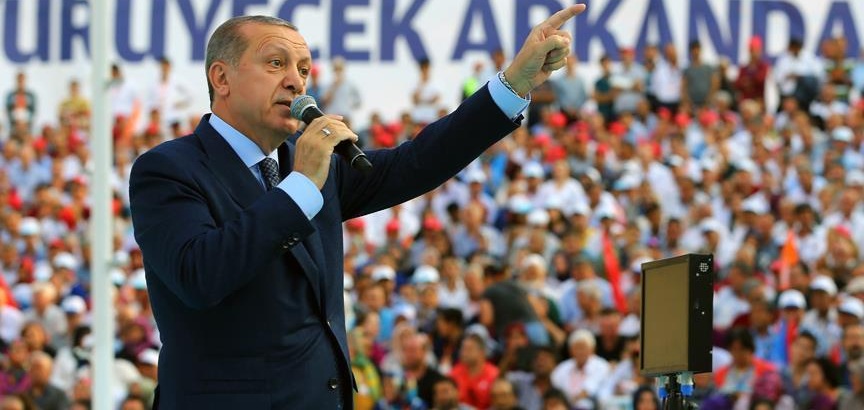Alwaght- On the threshold of Turkey's election, Selahattin Demirtas, the imprisoned co-leader of the pro-Kurdish People’s Democratic Party (HDP), issued a statement from the jail arguing that President Recep Tayyip Erdogan is turning the militaristic policies at home and abroad into a sacred issue for his own political interests. Demirtas added that Erdogan continues this policy at the price of the Turkish youths’ life.
Demirtas was clearly reviling the Erdogan-led military actions over the past few years, including bombing campaigns against the Turkish-inhabited areas inside the county’s borders and the operations that take the military to cross-border missions like in Syria.
But HDP leader is not the only one blasting the president’s military actions policy inside and outside of the country. A couple of days ago, Kemal Kilicdaroglu, the president of Republican People’s Party (CHP), criticized the offensives led by the nation’s armed forces at home and abroad in Qandil Mountains in northern Iraq against the Kurds and said they were pursuing goals other than the stated ones.
Kilicdaroglu’s comments clearly question Erdogan’s argument that he was running the bombing operation in Qandil area as part of a broader war against terrorism. The CHP leader’s criticism implied that the president has election goals behind the military assaults. Turkey is scheduled to hold its parliamentary and presidential elections less than a week from now.
But Erdogan responded to the disparaging of his opponents, defending the military actions taken over the past few years, adding that Turkey continues to destroy the positions of the Kurdistan Workers’ Party (PKK) in Qandil Mountains and the operations in neighboring Syria’s territories.
Elections and Erdogan’s militaristic policy
The criticism from the opposition and Erdogan’s responses came while the country is holding its parliamentary and presidential elections simultaneously. According to the official figures, 60 million eligible voters are to choose a president from 6 candidates, among them the incumbent president Erdogan. The voters also should fill 600 parliamentary seats through their votes.
These elections are deemed a full-scale referendum on whether the Turkish citizens want Erdogan to continue his political life on the top of the nation’s governance structure. Perhaps it is because of this issue that his opponents blasted his foreign wars beside his economic and social agendas.
Certainly, for several years, Turkey has embarked on an aggressive and militaristic policy, leaving behind its policy of “zero-tensions with the neighbors.” Now militarism is a conspicuous feature of the foreign policy of Ankara in dealing with its neighbors such as Syria, Iraq, and Greece. Turkey is at loggerheads with its crucial ally Washington as it continues moving in this policy track.
As many political experts believe, accentuation of militarism in foreign policy works like a double-bladed sword for the policymakers. While the leaders can rely on this policy to consolidate the national unity to the advantage of their objectives, they can also come under fire for the heavy costs of military operations.
Erdogan’s policy is similar to the double-bladed sword, many argue. While his regular speeches, as well as government-run media outlets, signal he is running a nationalistic propaganda campaign to garner support to his military adventures on the Syrian soil, his controversial and, of course, costly involvement in the war is hammered by his critics.
The home criticism finds deeper ground for influence and acceptance by the public as Erdogan’s allies, like the US and Europe, ask him to work towards getting his forces out of Syria. Washington’s stance, beside other actors’ similar calls, send unfriendly signals to Erdogan, sharpening his domestic opponents’ blade of criticism.
Exploiting the foreign war
Despite heavy waves of attacks against his military operations in Syria and Iraq, Erdogan has vigorously defended his postures. In his campaign speeches, Erdogan insisted that he would press ahead with the anti-Kurdish offensive in Syria, signaling that he still had the resolve to play with the card of defending the country against the foreign threats to secure a victory both for his party and himself as a presidential candidate.
A look at the cross-border military campaigns over the past years draws an obvious coincidence between them and the political developments at home. For example, the Operation Euphrates Shield, which was an important phase of military involvement in the Syrian conflict, was resumed in August 2016, a month after a failed military coup against Erdogan. Intervention in Syria’s Afrin, dubbed Operation Olive Branch, was launched on January 20 against the Syrian Kurdish militias holding the northern city. A little more than a month later, Erdogan announced snap elections in the country. In fact, the early elections were announced after Afrin capture.
To put it differently, Erdogan sought an alliance with the far-left National Movement Party and also the army using the Afrin campaign. The Afrin capture offensive also served a will of Erdogan to choke the voice of the opposition at home. The government reacted to the smallest criticism of Afrin operation under the argument of the Ankara right to defend itself. When the army staged the offensive, the nation’s media climate became scene to Erdogan’s nationalistic speeches. In his words, the army, government, and party were united and rallied behind him.
So, the current Turkish battle on the Syrian soil is a strongly effective instrument for Erdogan to veil some of the challenges at home, including the economic growth slowdown starting since past few years. Economic boost was a key dynamic legitimizing and empowering his over-a-decade ruling of the country.
On the other side, his visit of the operating forces in a military uniform for many echoed his long-sought neo-Ottoman power. But this even compounded the opposition-led anti-war disparagement. Still, we need for the elections result to see if such policy served Erdogan’s interest amid suggestions that the June 24 dual elections pose as a poll that will either remove him from power or cement his political strength.



























